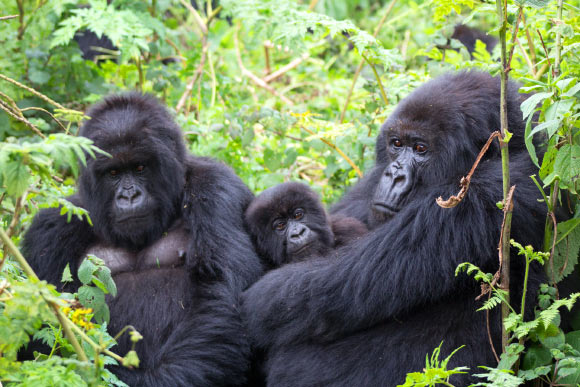Researchers have detected a herpes virus in wild mountain gorillas (Gorilla beringei beringei) that is very similar to Epstein-Barr virus in humans.

A family of mountain gorillas in Volcanoes National Park, Rwanda. Image credit: Tierra Smiley Evans, University of California, Davis.
Epstein-Barr virus is a gamma herpesvirus in the genus Lymphocryptovirus.
It is one of the most widespread and prevalent human pathogens, infecting over 90% of humans and persisting for their lifetimes, typically without major health consequences or symptoms.
The virus can be challenging, however, for people with HIV/AIDS and suppressed immune systems, leading to certain forms of cancer.
Epstein-Barr virus is also one of the major causes of mononucleosis, commonly called the ‘kissing disease.’
Dr. Tierra Smiley Evans from the University of California, Davis, and co-authors found that wild mountain gorillas have their own version of this herpes virus — a specific strain of lymphocryptovirus 1 (GbbLCV-1).
In the study, the team collected plant samples chewed and discarded by mountain gorillas in the two remaining subpopulations, the Virunga gorillas residing in the Virunga Massif (spanning Rwanda, Uganda, and the Democratic Republic of Congo) and the Bwindi gorillas residing in the Bwindi Impenetrable Forest in Uganda.
The researchers then analyzed the saliva left on the plants.
This non-invasive, oral sampling technique showed that GbbLCV-1 is widespread, infecting 52% of infant gorillas studied. That is a similar rate to what is found in human infants in less developed countries.
“GbbLCV-1 carries little health risk for otherwise healthy mountain gorillas and, like Epstein-Barr virus, is typically dormant in their bodies,” the scientists said.
“None of the live gorillas studied showed symptoms of having it.”
However, the authors found that some infant gorillas who died of natural causes and were necropsied had ‘pulmonary reactive lymphoid hyperplasia,’ a condition seen in human infants and young children with HIV/AIDS who become infected with Epstein-Barr virus.
The findings could provide valuable information for human disease and have conservation implications for the gorillas.
“Viruses can behave similarly in different species,” Dr. Evans said.
“Learning about how gorillas react to this virus in their natural setting may help us have a better understanding of how Epstein-Barr virus affects human infants.”
The research is published in the journal Scientific Reports.
_____
Tierra Smiley Evans et al. Mountain gorilla lymphocryptovirus has Epstein-Barr virus-like epidemiology and pathology in infants. Scientific Reports 7, article number: 5352; doi: 10.1038/s41598-017-04877-1







